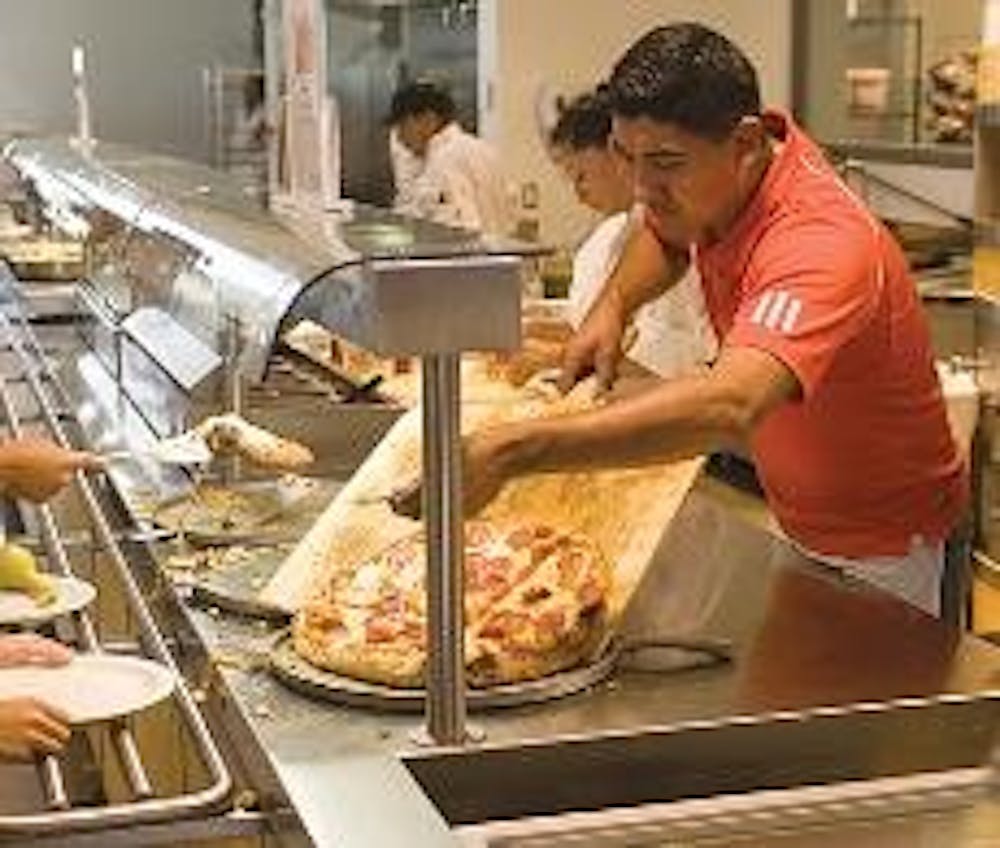Serveries offer better options

West Servery is not the only novelty in Rice's dining options this year. Money saved from last semester's removal of trays from the college serveries is being put toward more expensive, higher-quality and healthier beef and seafood options. The new menu choices this year include all-natural, antibiotic- and hormone-free Angus beef, as well as seafood that follows the Monterrey Bay Seafood Watch Program guidelines, a set of recommendations for purchasing seafood from sustainable sources to promote thriving oceans.
Director of Residential Dining David McDonald said at the end of the last fiscal year, in June, the savings from removing trays in the serveries were substantial enough to introduce an increased food variety this semester.
In February, the Student Association passed a resolution for trayless dining in the serveries. SA President Patrick McAnaney said the model was based on a similar plan implemented at the University of Texas at Austin and other college campuses. The resolution was enacted campuswide in March. The trays are now being held in storage, McDonald said.
Since the introduction of the trayless initiative, Rice has seen a decrease of 11 percent in chemical and water use and a two percent savings. The savings, approximately $70,000, mean that the same amount of food can be purchased for 2 percent less, McDonald said.
"We're a zero-sum game," McDonald said. "Whatever money we can save, we put back into the food."
This has given College Food Services more money to provide students with Angus beef, whereas last year they provided students with non-Angus beef.
"Angus is the gold-standard," McDonald said in an e-mail.
The savings also enabled College Food Services to make a good-faith effort to buy farm-raised seafood from the United States and South America, which is more sustainable than the cheaper seafood that can be bought from places like Indonesia, McDonald said.
Currently, the serveries offer nearly 15 types of seafood, including tilapia and salmon, McDonald said. He added that due to the expertise of Rice's chefs, College Food Services can buy whole fish and fillet them on site, which causes less food waste.
The fish is not the only thing that is prepared directly in the serveries.
"We're 90 percent scratch-made kitchens, so . [we've] taken out a lot of the preservatives and things that come with pre-packaged foods," McDonald said.
The next thing McDonald said he wanted to tackle is antibiotic- and hormone-free chicken. He said the high cost of chicken will probably prevent it from being purchased this year, but such a change might be realized by next fall.
"Those are the big things - beef, seafood and chicken - that we purchase," he said.
On a smaller scale, McDonald said College Food Services has tried to vary the rice offered in the serveries by incorporating more expensive types, such as jasmine rice and basmati rice. He also said whole grain pastas are being offered occasionally.
"We can't do it all the time, but where we can we are trying to introduce [it]," McDonald said.
These changes are not being implemented for solely sustainable purposes, however. He said he has tried to emphasize wellness with the purchases he has been in charge of this year.
"Over the next 10 years, wellness will be the focus," he said. "[I'm] trying to find whatever I can do to make things better."
Now that the higher-quality beef and seafood has been introduced, it will become servery-standard, McDonald said.
"Once we introduce something, we will build it into our model," he said. "From this point forward, we won't change unless some major catastrophe happens."
Martel College sophomore Amy Altchuler, disappointed by the selection of seafood last year, said she has been impressed by the changes in variety.
"This year is definitely an improvement over last year," Altchuler said. "There's just more fish in general."
McDonald said when the trayless dining initiative was implemented last year he received virtually no negative feedback. He added that there has been praise from students about the higher-quality food options this year.
"I've gotten a lot of good feedback from students this year about the menus, so it leads me to believe we're on the right track," McDonald said.
More from The Rice Thresher

Over 1,000 students petition against new meal plan
When Konstantin Savvon opened the Housing and Dining email announcing the new unlimited meal plan, he was instantly concerned about the impact on off-campus students like himself.

Rice football wins season opener under new coach
For the first time since 2018, Rice football opened its season with a victory. Scott Abell was soaked with yellow Powerade following a 14-12 win on the road Saturday against the University of Louisiana at Lafayette, which won 10 games and made it to the Sun Belt Conference championship last season.

Acting like an athlete: Rice basketball alum takes on Broadway
Underneath Chadd Alexander’s Broadway costume, there’s ankle tape and wrist braces — same protective gear he wore as a walk-on basketball player at Rice, though now he’s performing eight shows a week in the ensemble of “Harry Potter and the Cursed Child” instead of running conditioning drills in Tudor Fieldhouse.

Please note All comments are eligible for publication by The Rice Thresher.